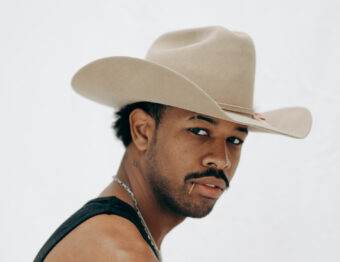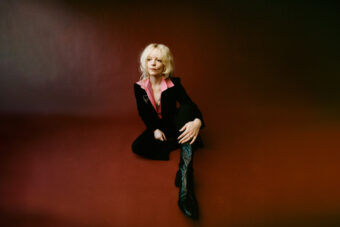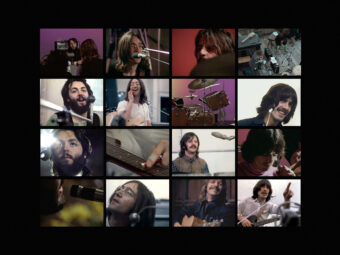Turns out, like most college students, Hataałii (pronounced: Hah-toth-lee) was running late due to computer issues. After getting up around noon and watching Navajo Cops, the 20-year-old University of New Mexico film major (he “thinks” he’s a junior) has a laid-back, sunshiny warmth that preludes a refreshingly casual chat. The fact that this interview takes place on the precipice of the June 30 release of his newest album, Singing Into Darkness, does not inspire urgency or any PR-training sales tactics, but rather a Spicoli-esque, easy-does-it, in-the-moment realness. This is a good thing.
Hataałiinez Wheeler was raised in Window Rock, Arizona, the capital of Navajo Nation — Tségháhoodzání in Navajo. The album cover is an artistic depiction of Hataałii’s home, the signature rock with the round hole as the backdrop.
He describes growing up in solitude, “making music on my own on a laptop somewhere…” By 14 he’d taught himself to play bass with the help of YouTube on an instrument his dad picked up at a flea market. By 16 he’d released his first album, Banana Boy, the result of his self-imposed challenge to write a song a day, followed by 2020’s Painting Portraits.
“I’m still a kid, and I make a lot of mistakes all the time. I always tell myself that it’s just because I’m a little kid and I don’t really know anything yet,” he says. His nickname, Hataałii, is a Navajo term that means “to sing” or “singer,” specifically healers who perform rituals for the body, mind, and spirit using ceremonial chants. Hataałii feels his songs tell stories.
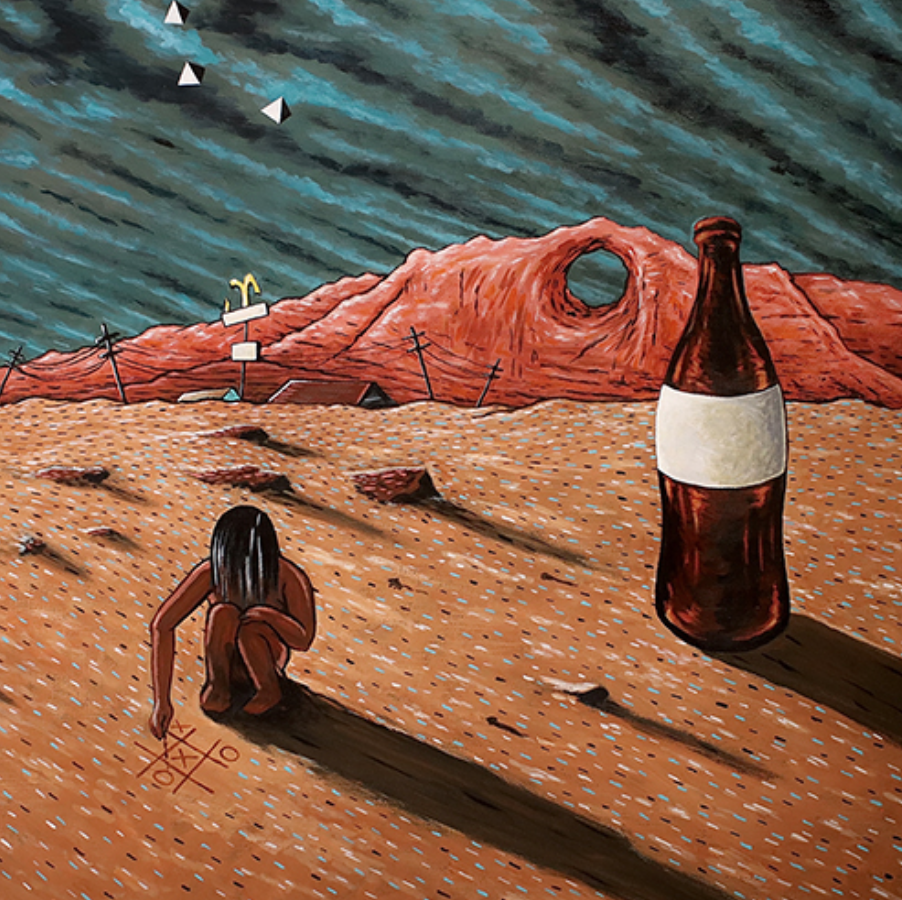
The demos for Singing Into Darkness, as he explains, were created during his first year at UNM, but professionally recorded last year. Or was it this year? He’s not sure and not bothered by details like that. Eventually, he says, the songs fell into the hand of someone at Dangerbird Records, which led to “meetings and stuff.” Delicately produced by Joel Jerome, the work is allowed to exist in its most simplistic form, sounding like something that’s been unearthed or plucked from a decades-old reel-to-reel studio. The first song on Singing Into Darkness, “Midnight Soldier,” might encapsulate all the Lou Reed/Jim Morrison/Eric Burden comparisons.
Straight off there’s history here.
When I mention this, he asks: “What do you mean by history? History of my life or history of the world?”
“History of the world,” I say.
“That’s cool. I like that,” he smiles.
I attempt to explain the power of his music by letting him know how much music I listen to throughout the day.
“For your job?” he asks.
“Yes. For my job.”
“Oh, that’s cool.”
Apparently, just another day being compared to Lou Reed for Hataałii, though he doesn’t exactly call himself an “ultimate fan,” unless you count that time he was skateboarding around UNM at 2:00 in the morning listening to “Coney Island Baby.” “I remember ‘Coney Island Baby’…that was peak life experience,” he says, wistfully.
When asked how he feels about the album, he refers to both the process of making it and the music itself as strange: “It just all came together very strangely. That’s very attractive to me.”
“Strange” is a positive—so is “weird.”
“I think everything I do is a little weird,” he says. “It’s weird when you make something and it’s there in front of you and it’s almost like its own little self. That doesn’t mean it’s bad. It’s just very weird.”
SPIN: What do you want to do with your film degree?
Hataałii: I don’t really know. I just want to do something. Film felt like the most practical thing to do in the art realm of things.
That’s interesting. Where did the songs come from for you?
I wish I knew what part of the brain it came from, but I haven’t really—I’m too lazy to do that research about stuff.
It could even come from my bone marrow, because I think nature itself is very strange. It wouldn’t surprise me if the answer was something nobody really thought of before. As of the imagination and everything…I guess it’s my ability to let things fall wherever they fall that really has gotten me anywhere. If anything, that’s what I owe it to.
What were your musical influences?
I got a lot of my music taste from [my dad]. Like the Cure and New Order. I listened to a lot of that. I never really got into hardcore. I used to play sports in middle school, and everybody was always listening to music that pumped them up and stuff.
I think the closest I got to that was “Thunderstruck” by AC/DC or “God’s Plan” by Drake, but other than that…I would only listen to soft, awkward-phased teenage music. I think I wasn’t good at sports because of that. I wasn’t very hyped-up enough to have that competing attitude. I think that because I wasn’t good in sports, I wanted to be good in something else.
I don’t know if I was bad at it. I would throw up all the time at the meets because I would get too nervous. I was a pretty good hurdler, though. I’ll give myself that.
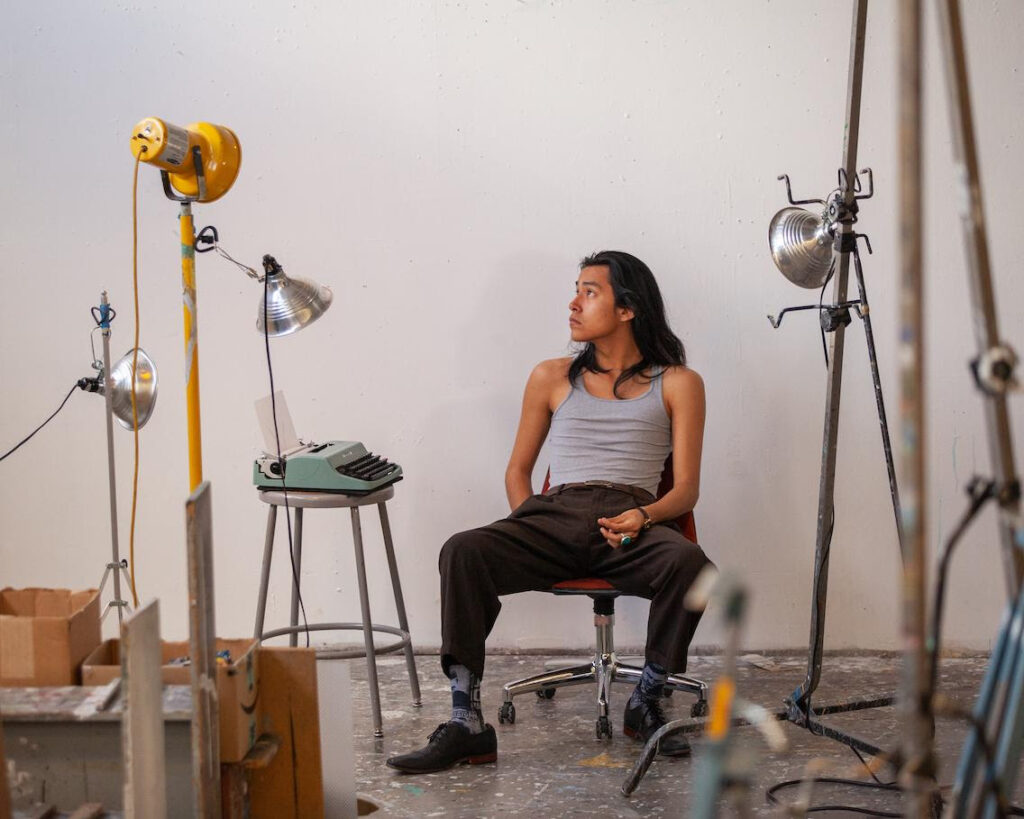
Are your parents supportive of you?
My parents are very supportive of me. I don’t know if they really understand a lot of what I’m doing, but I think that they recognize that not only is it a lot of opportunity…I feel like they think that it makes me a better person somehow. They like that I do this, or that I try to do this. My dad…I think he wanted to be a painter. He still paints sometimes. He’s pretty well-versed in the art world, I would say.
My mom is a professor. She has her PhD in English or something. I would say both of my parents have definitely had their influence on me growing up.
What part does your heritage play in your music?
It overlays almost everything that I do, but not because I push it, it’s just there because… I don’t really know any other way of life. I don’t have any other lifestyle to compare it to except my own. I would say that Navajo culture and everything is very embedded in most of the things I do.
Any way it influenced this album specifically?
Yes, I think it did a lot… For some reason, I started writing really weirdly, or writing songs, the words of songs. I think what’s in this new record is…within the songs is something that has always just been there for me growing up and whatnot. It’s not really something that just came up. It was like I finally got the ability to just let that come out.
Where do you see your music career going from here?
I don’t know. I guess this record will come out, and I don’t know if Dangerbird wants to do another record. I’ve been a little bit troublesome, so I don’t know if they would want me back. If not, I’d probably just stick around here and make songs still and release them on my own, and probably go work at Costco.


